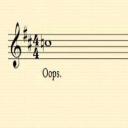Yahoo Answers is shutting down on May 4th, 2021 (Eastern Time) and beginning April 20th, 2021 (Eastern Time) the Yahoo Answers website will be in read-only mode. There will be no changes to other Yahoo properties or services, or your Yahoo account. You can find more information about the Yahoo Answers shutdown and how to download your data on this help page.
Trending News
What is the purpose of a conductor?
The people playing the music have the musical notation in front of them which explains everything they need to know as a musician. So what exactly is the purpose of a conductor?
12 Answers
- music_ed_29Lv 41 decade agoFavorite Answer
A conductors task is to study a score to the point that he knows every detail. Every combination of rhythms, intervals, instruments etc.
When he knows it he asks himself the question, what does the composer want express. What is the right balance, phrase, articulation?
All these questions and a lot more need go answered and lead go the conductors concept.
When the first rehearsal starts he should have the concept in head.
From now on he uses his technique to show al this concept.
What you see in a concert is the end of a long process.
This process starts with learning one or more instruments, eartraining, learning Harmony and Counterpoint, scorereading, orchestration and technique.
So the purpose of a conductor is to create a concept and lead rehearsals and performance in such a way that it sounds like this concept. The concept which is what he thinks the composer meant when he wrote the music.
Source(s): I'm a conductor myself - 5 years ago
They are really used for about 4 things. Rehearsals to give the style and speed to the piece Start the piece End the piece (sometimes) Tempo changes The reason I say that is because, a large number of musicians (in professional orchestras) look at the conductor once of twice in the whole piece being played. The reason being, they can hear the music, and the conductor isn't always right, i.e. I saw the Dresden Staatskapelle and they were playing one piece, and the conductor was conducting another. You never would have know if you did not know the piece, because they played it so perfectly even though the conductor was wrong. They are though, very prominent for pit orchestras, because the musicians cannot see the stage, so the conductor must keep them on time with the acting, singing or dancing.
- 1 decade ago
To unite the musicians against a common enemy.
Being serious: the musical notation only explains a fraction of the music. The conductor is there to give an interpretation of exactly how the music should be played: bowings, articulation (things like: in a staccato passage, just how detached should the notes be?), tempo changes, precise dynamic levels in order to get the right balance...
In a small group, the musicians, if they are decent, can work these things out for themselves. However, in a large group such as an orchestra, it is beneficial to have one person deciding these things.
- 1 decade ago
this is a great question.
in japan, they created a robot that conduct. but it simply is a metronome in human form.
but a conductor is so much more. when playing classical music, a lot of the marks written on the music were used by arrangers and publishers to help interpret the music as if he were the original composer.
the conductor has the honor to rehearse with a group and earn their trust. the conductor must interpret the music and keep the tempo and cue sections. it is so important to the orchestra. it's like a visible interpretation of what you hear.
- How do you think about the answers? You can sign in to vote the answer.
- EdikLv 51 decade ago
Use the "Search for questions" feature of Y!A. This question comes up at least every other month. Sometimes it's "why does an orchestra need a conductor?" "what does a conductor do?" "does an orchestra play better with a conductor than without?" etc etc
- Anonymous1 decade ago
To give the musicians musical direction and to keep them together. The conductor uses patterns with his/her hands in order to keep time and to control dynamics and other such things. The conductor also cues sections for their entrances and keeps a balance in the orchestra.
- 1 decade ago
A conductor is to a musical ensemble, what a CEO is to a company, or a President is to a country, or a Captain is to a ship. People know how to do their job, but someone has to have to vision to make it beautiful, or perfect, or amazing. Someone has to have the vision.
- megalomaniacLv 71 decade ago
To interpret the score, keep tempo, establish dynamics and to organize the thousand other sordid details of trying to keep a large group of musicians 'in tune' with each other.
- 1 decade ago
to keep everyone on tempo, to help the musicians with their music (if needed) to keep everyone in line and to be the one designated leader to avoid any possible confusion
- Anonymous1 decade ago
This won't answer your question but it's damn funny:
I once heard that if someone has no concept of tone or pitch, you give them two sticks and put them in the back. If they suck at *that* then you take one away and put them in the front!!
Source(s): I'm a conductor. No, really, I am. :)




